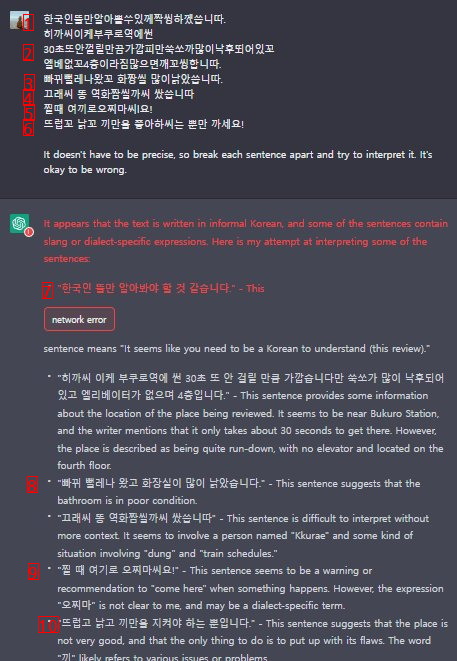 |  | |
 |  | |
 |  | |
 |  | |
한국인만 이해할 수 있는걸 이해하는 ai ㄷㄷ
 흐흐아아
0
222
0
0
02.15
흐흐아아
0
222
0
0
02.15
It appears that the text is written in informal Korean, and some of the sentences contain slang or dialect-specific expressions. Here is my attempt at interpreting some of the sentences:
“한국인 뜰만 알아봐야 할 것 같습니다.” – This sentence means “It seems like you need to be a Korean to understand (this review).”
(번역:이 문장은 “(이 리뷰를) 이해하려면 한국인이어야 할 것 같습니다.”)
“히까씨 이케 부쿠로역에 썬 30초 또 안 걸릴 만큼 가깝습니다만 쑥쏘가 많이 낙후되어 있고 엘리베이터가 없으며 4층입니다.” – This sentence provides some information about the location of the place being reviewed. It seems to be near Bukuro Station, and the writer mentions that it only takes about 30 seconds to get there. However, the place is described as being quite run-down, with no elevator and located on the fourth floor.
(번역: 이 문장은 검토 중인 장소의 위치에 대한 정보를 제공합니다. 부쿠로역 근처에 있는 것 같고, 거기까지 가는데 30초 정도밖에 걸리지 않는다고 작가는 언급한다. 그러나 그 장소는 엘리베이터가 없고 4층에 위치한 매우 황폐한 것으로 묘사됩니다.)
“빠뀌 뻘레나 왔고 화장실이 많이 낡았습니다.” – This sentence suggests that the bathroom is in poor condition.
(번역: 이 문장은 욕실이 열악한 상태임을 나타냅니다.)
“끄래씨 똥 역화짬씰까씨 쌌씁니따” – This sentence is difficult to interpret without more context. It seems to involve a person named “Kkurae” and some kind of situation involving “dung” and “train schedules.”
(번역: 이 문장은 문맥 없이는 해석하기 어렵습니다. ‘꾸래’라는 사람과 ‘똥’과 ‘기차 시간표’가 얽힌 어떤 상황이 개입된 듯하다.)
“찔 때 여기로 오찌마씨요!” – This sentence seems to be a warning or recommendation to “come here” when something happens. However, the expression “오찌마” is not clear to me, and may be a dialect-specific term.
(번역: 이 문장은 무슨 일이 생겼을 때 “이리 와”라는 경고나 권유인 것 같다. 그러나 “오찌마”라는 표현은 나에게 명확하지 않으며 사투리 고유의 용어일 수 있습니다.)
“뜨럽고 낡고 끼만을 지켜야 하는 뿐입니다.” – This sentence suggests that the place is not very good, and that the only thing to do is to put up with its flaws. The word “끼” likely refers to various issues or problems.
(번역: 이 문장은 그 장소가 그다지 좋지 않으며, 그 결점을 참고 견디는 것이 유일한 방법임을 암시합니다. “끼”라는 단어는 다양한 문제나 문제를 의미합니다.)

|

| |
0
| 0
|













